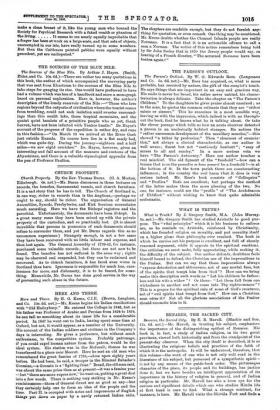HERE AND THERE.
Here and There. By H. G. Keene, C.I.E. (Brown, Langham, and Co. 10e. 6d. net.) —Mr. Keene begins his Indian recollections with "Old Haileybury." He entered the College in 1843, but as his father was Professor of Arabic and Persian from 1824 to 1834, he can tell us something about its inner life for a considerable period. In 1847 he went out to India, having spent some time at Oxford, but not, it would appear, as a member of the University. His account of the Indian soldiers and civilians in the Company's days is. interesting. He gives a preference, but without much enthusiasm, to the competitive system. Probably patronage, if you could expel human nature from the patron, would be the ideal system. His station was in the Mofussil ; thence he was transferred to a place near Meerut. Here he met an old man who remembered the great famine of 1783,—close upon eighty years before. He had been, he said, a trooper in the Himmal Bahadar's gossains,—a Gossain is a "fighting friar." Bread, the old man said, was about the same price then as at present—it was a famine year —but "there are more rupees now," he went on, putting a great deal jute a few words. There is nothing very striking in Mr. Keene'e reminiscences—those of General Grant are as good as any—but they certainly help one to form an idea of the people and the time. Part II. is occupied with notes and impressions of English things put down on paper by a newly returned Indian exile. The chapters are readable enough, but they do not furnish any- thing for quotation, or even remark. One thing may be mentioned. Mr. Keene doubts whether the Channel Islands people are really Normans. It is a fact that it is an actionable offence to call a man a Norman. The writer of this notice remembers being told by Sir John Seeley that in 1870 the Jersey people would say, on hearing of a French disaster, " The accursed Normans have been beaten again ! "


























































 Previous page
Previous page